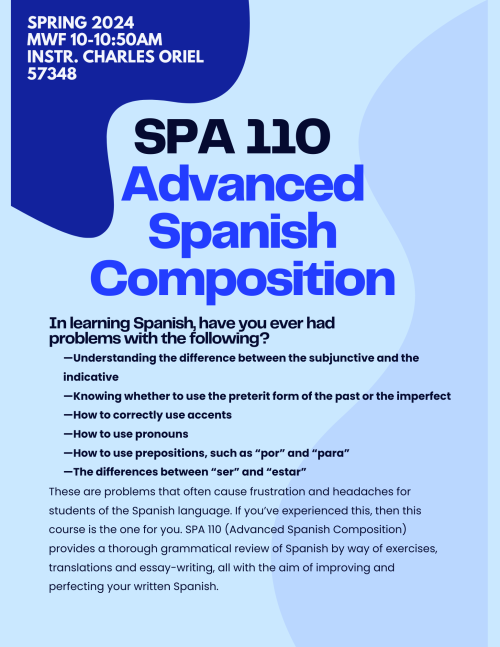Spring Quarter 2024
- For day, time, room, and TA information, see our SPANISH SCHEDULE, Portuguese Schedule or the class search tool https://registrar-apps.ucdavis.edu/courses/search/index.cfm.
- For all courses not described here, please refer to the General Catalog course descriptions: https://catalog.ucdavis.edu/courses-subject-code/spa or https://catalog.ucdavis.edu/courses-subject-code/por
Undergraduate Lower Division Courses
SPA 001, 002, 003 Elementary Spanish
SPA 001Y, 002Y, 003Y Elementary Spanish
SPA 002V, 003V Elementary Spanish
SPA 021, 022 Intermediate Spanish
SPA 0022V Intermediate Spanish II
SPA 023 Spanish Composition I
SPA 024 Spanish Composition II
SPA 032 Intermediate Spanish for Native Speakers II
SPA 033 Intermediate Spanish for Native Speakers III
Undergraduate Upper Division Courses
SPA 110 Advanced Spanish Composition
Charles Oriel
In learning Spanish, have you ever had problems with the following?
- Understanding the difference between the subjunctive and the indicative
- Knowing whether to use the preterit form of the past or the imperfect
- How to correctly use accents
- How to use pronouns
- How to use prepositions, such as “por” and “para”
- The differences between “ser” and “estar”
These are problems that often cause frustration and headaches for students of the Spanish language. If you’ve experienced this, then this course is the one for you. SPA 110 (Advanced Spanish Composition) provides a thorough grammatical review of Spanish by way of exercises, translations and essay-writing, all with the aim of improving and perfecting your written Spanish.

SPA 111N Sounds & Words
Travis Bradley
SPA 116 Applied Linguistics
Claudia Sanchez
SPA 133N Golden Age Literature of Spain
Charles Oriel
SPA 141 Intro to Spanish Culture
Robert Newcomb
SPA 151 Survey of Latin American Literature 1900 to Present
Leopoldo Bernucci
SPA 153 Latin American Short Story
Ana Peluffo
SPA 157 Latin American Great Works
Robert Newcomb
SPA 168 Intro to Latinx Culture
Emily Vazquez Enriquez
SPA 170 Intro to Latin American Culture
Robert Irwin
SPA 177 California & Latin America
Robert Irwin
Graduate Courses
SPA 215- Special Topics in Hispanic Linguistics- Metodología de investigación cualitativa
Claudia H. Sánchez Gutiérrez
Tuesdays, 4:10-7:00, Olson 117
En este seminario exploraremos algunas de las metodologías más habituales en investigación cualitativa, como las entrevistas, focus groups, o etnografías, entre otras. Al comienzo del trimestre, cada estudiante seleccionará un tema sobre el que quiera trabajar y, en cada clase, irá aplicando lo que aprendamos en clase a su proyecto. Se tratará de pasar por las diferentes etapas en un proyecto de investigación, empezando por la búsqueda de bibliografía apropiada, el planteamiento de una hipótesis y de preguntas de investigación, la selección de una metodología que permita responder dichas preguntas, la organización logística de la recogida de datos piloto, y el análisis de los datos preliminares obtenidos. A lo largo del curso, también se plantearán cuestiones de orden ético relacionadas con la recogida de datos con individuos y grupos de personas.
SPA 224- Spanish Literature Studies-The Five Senses and the Early Modern Spanish Atlantic
Daniela Gutierrez-Flores
Mondays, 4:10-7:00, Olson 109
Drawing on the notion that sensory experience and perception are historically and culturally contingent, this seminar explores the role of the five senses in the cultural dynamics of the early modern Spanish Atlantic. Focusing on different themes —religiosity, urban life, racialization, natural history, and medicine—, we will interrogate how the senses shaped everyday life in Spain and the Spanish Americas. Among the questions we will tackle are: How did odors, textures and sounds form notions of class, gender and race in the urban centers of the Spanish empire? How did early colonizers and explorers understand the natural world of the Americas through smelling, tasting and touching? How did ecclesiastical and secular authorities discipline sensorial regimes? We will approach cultural objects through the sensorium they evoke and represent, engaging with theoretical and historical scholarship.
In keeping with the seminar’s goal to engage the five senses as vehicles of inquiry, we will combine the study of cultural artifacts—art, sculpture, music, fragrances, and food—with critical readings of literary works. Students will also engage with sensorial archeology to examine the methodological challenges and possibilities of sensory studies when studying literature and culture. By the end of this course, you will be able to 1) critically evaluate theoretical literature, as well as early modern historical and literary texts; 2) identify major trends, authors, methodologies and works of early modern Sensory Studies, and 3) develop a critical understanding of the interdisciplinary field of Sensory Studies and its contributions to Cultural and Literary Studies.
SPA 274- Latin American Literature Studies-The Circulation of Affect and Emotions in Latin America-Ana Peluffo
(can be used as a substitute for SPA 203)
Wednesdays, 4:10-7:00, Olson 109
In this seminar, we will study the cultural construction of emotions and their effects in diverse historical, political, and geographical Latin American contexts. We will map out what has been called the “affective turn” and its contributions to feminism, critical race theory, and queer studies. In addition to reading theoretical texts about the politicization of emotions and affective communities, we will study how emotions circulate between bodies, texts, and political regimes. We will read about how certain emotions have been used to combat racism, sexism, and homophobia and how they have been aestheticized in both canonic and noncanonical texts. Reading in an “emotional key” will allow us to re-examine established readings of the Latin American canon while also combating binary hierarchization. By compiling an eclectic archive that includes travel narratives, novels, conduct manuals, children's books, poetry, and visual artifacts, we will investigate the theoretical, cultural, and political implications of understudied emotions, including compassion, rage, happiness, shame, fear, and disgust. This course will be taught in Spanish.
